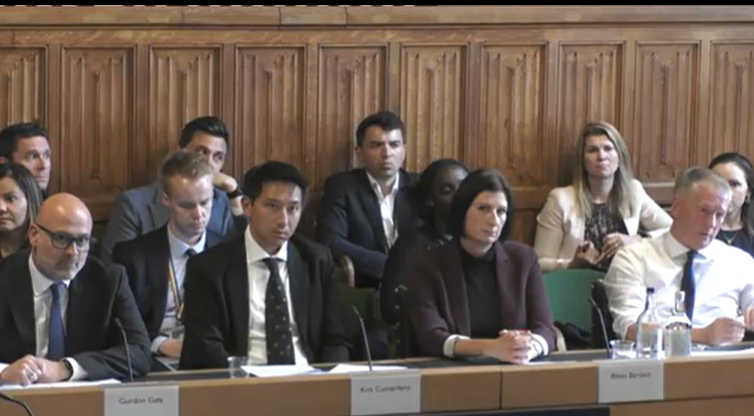In October 2023, California announced new legislation for reporting on carbon emissions. Learn what is involved in this legislation and how to begin preparing.
Never before has climate-related legislation been such an important feature of the business environment. California is taking the lead in the USA, passing new legislation with more stringent reporting requirements than comparative states. In October 2023, California promulgated new disclosure laws, which in a nutshell will require two types of reporting from applicable companies (except insurance providers) doing business in the state.
The first of the California climate disclosure bills is the Climate Corporate Data Accountability Act (SB253), which requires companies to disclose their greenhouse gas emissions. The second law, Greenhouse Gases: Climate-Related Financial Risk, requires them to report any financial risks associated with climate change.
This article will help companies and supply chain partners affected by the new laws understand what is required for compliance, as well as any challenges associated with adhering to California’s latest climate disclosure laws.
Summarising California’s new climate disclosure laws
The Climate Corporate Data Accountability Act (SB 253)
The Climate Corporate Data Accountability Act (SB 253) applies to large entities with revenue exceeding $1bn and either were formed in or operating in and around California. These entities will be required to compile and share annual reports regarding greenhouse gas emissions, which are classified into the following categories:
- Scope 1 refers to direct greenhouse gas emissions. In this context, ‘direct’ means any gases that originate from sources either controlled by or under the direct ownership of entities, regardless of their location.
- Scope 2 represents indirect emissions. For example, emissions from generating the energy that large entities consume or from purchased services involved in heating, cooling, or steam generation. Once again, emissions from all locations must be factored into annual reports.
- Scope 3 emissions, also referred to as ‘indirect upstream and downstream emissions’, are greenhouse gases generated across the supply chain. This includes everything from emissions generated by suppliers to the processing and eventual use of products. Emissions from commutes and business travel would also be included in this category.
The data must be assured by a third-party provider and made available on a public digital platform in the interest of transparency. This will allow the data to be viewed and aggregated by both stakeholders and eco-conscious consumers.
Greenhouse Gases: Climate-Related Financial Risk (SB 261)
Under SB 261, companies with an annual revenue over $500 million will be required to report on climate-related financial risk biennially. Subsidiaries need not submit a report if their parent companies have already done so on behalf of the group.
Climate-related financial risk has been defined in the new California law. Examples range from potential impacts on direct operations to financial market risks and overall economic health. For example, in California, where the increasing prevalence of wildfires is attributed to climate change, their impact not only on businesses but on the economy must be incorporated into disclosure reports (as well as what efforts are being made to mitigate climate-related risks).
Risk assessments must be framed in line with the guidance provided in the Task Force on Clited Financial Disclosures' 2017 report or any updates that are still to come. Alternatively, the IFRS Sustainability Disclosure Standards are seen as being equivalent to the aforementioned report.
Assembly Bill 1305: The Voluntary Carbon Market Disclosures Business
Regulation Act (AB 1305)
AB 1305 has also come into effect as of 1 January 2024 and requires companies to be transparent regarding their participation in the voluntary carbon market. This market consists of brokers that help companies purchase carbon emissions allowances (or ‘carbon credits’) and invest in carbon offset projects. However, efforts to regulate the market have been complicated by a lack of understanding as to what constitutes a high-quality carbon offset.
AB 1305 does not obligate companies to actively engage with the voluntary carbon market. Instead, it stipulates that those who do must disclose the full extent of their activities, including specific projects they are involved in and how much they are investing in reducing carbon emissions. AB 1305 also requires companies to provide information that backs up any claims related to carbon neutrality and net zero emissions. The aim is to curb instances of ‘greenwashing’ and provide stakeholders with accurate information about companies’ involvement in the voluntary carbon market.
How will California enforce new climate disclosure laws?
The California Air Resources Board (CARB) is an environmental protection agency that will oversee the regulation and enforcement of the reporting program. Their work will help to flesh out more of the practical details regarding the implementation of new legislation, although companies can now begin preparing for compliance.
In terms of future penalties, violating SB 253 could incur fines of up to $500,000, although regulators currently recognise the difficulties of calculating Scope 3 emissions. Therefore, between 2027 and 2030, there will only be a penalty for failing to file reports. Fines of up to $50,000 will be levied against entities that fail to make their financial risk reports public, or if reports are deemed inadequate by CARB. Finally, companies that breach the terms of AB 1305 could be subject to civil enforcement actions, as well as a daily fine of up to $2,500 (with a maximum total penalty of $500,000).
What companies will be most impacted by climate disclosure laws?
Companies that must take heed of California’s climate disclosure laws include large, multinational corporations. Most of these companies were aware that this kind of reporting would ultimately be required, and have been preparing for the eventuality. In fact, many companies are already submitting voluntary reports to the CDP (Carbon Disclosure Project). Besides this, several of the affected multinational businesses are already subject to climate change-related reporting in jurisdictions like the EU - and this includes financial risk assessments.
California may not be the first in the world to require climate disclosures, but it’s currently ahead of most of the US (with the state itself being the 5th most powerful economy worldwide). The new laws are therefore expected to have global influence, and the rest of the US, which often relies on California as a testing ground for new policies, will likely introduce similar legislation.
What are the deadlines for compliance?
The first deadlines are set for the beginning of 2026 - and only require companies to be compliant with Scope 1 and Scope 2 emissions. Reports for Scope 3 emissions must be completed by 2027. From 2027 onward, Scope 3 emissions must be submitted within 180 days of disclosing Scope 1 and 2 emissions. 1st January 2026 is the deadline for SB 261 (risk) disclosure.
How can companies prepare for California’s Climate Disclosure Laws?
On the surface, the new California climate disclosure laws have the greatest impact on companies with annual revenue exceeding $1 bn - but the knock-on effect will impact their entire supply chains. By targeting large and powerful corporations, California is seeking to influence the entire business ecosystem surrounding them.
Businesses that may be impacted by the new laws, either directly or indirectly, must begin preparing imminently. It may well be that the smaller players, who have not been exposed to climate disclosure bills elsewhere in the world, will have the most work to do.
Understand the standards on which the law will be based
The first step will be developing a strong understanding of Greenhouse Gas Protocol standards, which also includes guidance on accounting for emissions. A valuable source of information is the website for the Task Force on Climate-related Financial Disclosures (TCFD), which will help relevant organisations become fluent in how climate risks can be assessed within the context of financial markets.
Engage carbon accounting experts
Carbon accounting firms can help with data collection and the necessary preparation that comes before disclosure. Many of these firms have demonstrable experience in carbon accounting for specific industries. While Foods Connected may not specialise in carbon accounting, our software can be used to provide emissions analytics (including an analysis of Class 3 emissions) with a particular focus on the food and beverage industry.
Work with disclosure committees and assurance providers
Boards will have to consider which measures should be taken to ensure an efficient and effective compliance program. Qualifying businesses must engage with an independent assurance provider, as this is a requirement of SB 253. As a further step toward ensuring the accuracy of the data to be disclosed, companies may form disclosure committees to ensure rigorous reporting and compliant results.
Participate actively in legislative processes
Some of the specific procedures governing California’s climate disclosure bills are still being formulated by CARB. The public will be notified of proposed regulations during this process, and commentary from interested and affected parties can be referred for consideration. Participation in the process will not only keep companies updated as to progress but allow them to play a more active role in the formulation of regulations.
Some of the specific procedures governing California’s climate disclosure bills are still being formulated by CARB. The public will be notified of proposed regulations during this process, and commentary from interested and affected parties can be referred for consideration. Participation in the process will not only keep companies updated as to progress but allow them to play a more active role in the formulation of regulations.
Foods Connected is committed to helping organisations in the food and beverage industry keep their CSR initiatives on track with data-driven insights. Interested in how our software can help you accurately report on CSR - including your efforts to actively reduce carbon emissions? Download our FREE CSR and Sustainability whitepaper or request a demo of our CSR and sustainability management software today.
This blog post is not legal advice for your company to use in complying with US legislation like the Californian Climate Disclosure Laws. Instead, it provides background information to help you better understand them. This legal information is not the same as legal advice, where an attorney applies the law to your specific circumstances, so we insist that you consult an attorney if you’d like advice on your interpretation of this information or its accuracy.
.jpg)
Greer McNally
Greer has over 15 years’ experience writing about trends in the food and retail sectors. She lives in a little village by the sea in Northern Ireland and loves creating content that informs how people think about the food industry. A recent career highlight was interviewing the legend that is Dr Temple Grandin.
Stay up to date
Stay up to date
Browse Posts
- February 2026
- January 2026
- December 2025
- November 2025
- October 2025
- September 2025
- August 2025
- July 2025
- June 2025
- May 2025
- April 2025
- March 2025
- February 2025
- January 2025
- December 2024
- November 2024
- October 2024
- September 2024
- August 2024
- July 2024
- June 2024
- May 2024
- April 2024
- March 2024
- February 2024
- January 2024
- December 2023
- November 2023
- October 2023
- September 2023
- August 2023
- July 2023
- June 2023
- May 2023
- April 2023
- March 2023
- December 2022
- November 2022
- October 2022
- September 2022
- August 2022
- July 2022
- June 2022
- May 2022
- April 2022
- March 2022
- February 2022
- January 2022
- December 2021
.png)


/Blog%20Headers/shutterstock_1927957907%20(1).jpg)
/Blog%20Headers/shutterstock_1845178195%20(2).jpg)
/Blog%20Headers/shutterstock_2133827717%20(1).jpg)
/Blog%20Headers/shutterstock_2473376713.jpg)
/Blog%20Headers/shutterstock_2474442759.jpg)





![[Infographic] Story of a hamper: understanding the traceability journey](https://blog.foodsconnected.com/hubfs/Blog%20Imagery%20(PI%20AUTOMATED)/Blog%20Headers/Story%20of%20a%20hamper%20understanding%20the%20traceability%20journey.jpg)
/Blog%20Headers/shutterstock_2468439127.jpg)
/Blog%20Headers/shutterstock_2498984931.jpg)

/Blog%20Headers/shutterstock_1834054435.jpg)
/Blog%20Headers/Preparing%20for%20the%20EU%20Deforestation%20Regulation%20(EUDR)everything%20you%20need%20to%20knowjpg.jpg)

.png)

.png)